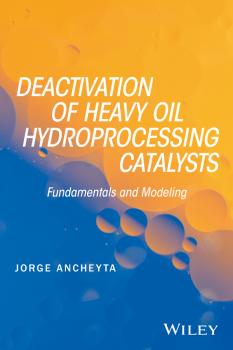ТОП просматриваемых книг сайта:
Jorge Ancheyta
Список книг автора Jorge AncheytaАннотация
Written by a scientist and researcher with more than 25 years of experience in the field, this serves as a complete guide to catalyst activity loss during the hydroprocessing of heavy oils. Explores the physical and chemical properties of heavy oils and hydroprocessing catalysts; the mechanisms of catalyst deactivation; catalyst characterization by a variety of techniques and reaction conditions; laboratory and commercial information for model validations; and more Demonstrates how to develop correlations and models for a variety of reaction scales with step-by-step descriptions and detailed experimental data Contains important implications for increasing operational efficiencies within the petroleum industry An essential reference for professionals and researchers working in the refining industry as well as students taking courses on chemical reaction engineering
Аннотация
A practical approach to chemical reaction kinetics—from basic concepts to laboratory methods—featuring numerous real-world examples and case studies This book focuses on fundamental aspects of reaction kinetics with an emphasis on mathematical methods for analyzing experimental data and interpreting results. It describes basic concepts of reaction kinetics, parameters for measuring the progress of chemical reactions, variables that affect reaction rates, and ideal reactor performance. Mathematical methods for determining reaction kinetic parameters are described in detail with the help of real-world examples and fully-worked step-by-step solutions. Both analytical and numerical solutions are exemplified. The book begins with an introduction to the basic concepts of stoichiometry, thermodynamics, and chemical kinetics. This is followed by chapters featuring in-depth discussions of reaction kinetics; methods for studying irreversible reactions with one, two and three components; reversible reactions; and complex reactions. In the concluding chapters the author addresses reaction mechanisms, enzymatic reactions, data reconciliation, parameters, and examples of industrial reaction kinetics. Throughout the book industrial case studies are presented with step-by-step solutions, and further problems are provided at the end of each chapter. Takes a practical approach to chemical reaction kinetics basic concepts and methods Features numerous illustrative case studies based on the author’s extensive experience in the industry Provides essential information for chemical and process engineers, catalysis researchers, and professionals involved in developing kinetic models Functions as a student textbook on the basic principles of chemical kinetics for homogeneous catalysis Describes mathematical methods to determine reaction kinetic parameters with the help of industrial case studies, examples, and step-by-step solutions Chemical Reaction Kinetics is a valuable working resource for academic researchers, scientists, engineers, and catalyst manufacturers interested in kinetic modeling, parameter estimation, catalyst evaluation, process development, reactor modeling, and process simulation. It is also an ideal textbook for undergraduate and graduate-level courses in chemical kinetics, homogeneous catalysis, chemical reaction engineering, and petrochemical engineering, biotechnology.
Аннотация
Modeling and Simulation of Catalytic Reactors for Petroleum Refining deals with fundamental descriptions of the main conversion processes employed in the petroleum refining industry: catalytic hydrotreating, catalytic reforming, and fluid catalytic cracking. Common approaches for modeling of catalytic reactors for steady-state and dynamic simulations are also described and analyzed. Aspects such as thermodynamics, reaction kinetics, process variables, process scheme, and reactor design are discussed in detail from both research and commercial points of view. Results of simulation with the developed models are compared with those determined at pilot plant scale as well as commercial practice. Kinetics data used in the reactor model are either taken from the literature or obtained under controlled experiments at the laboratory.



